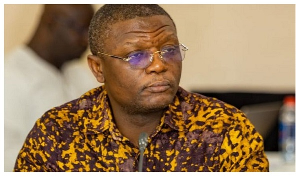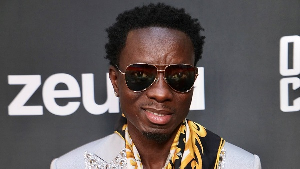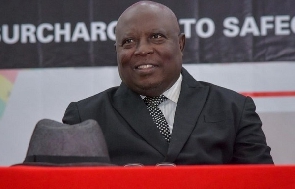JJ DEFIES PROTOCOL
. To preach June 4th virtues at a symposium
FORMER PRESIDENT JERRY JOHN RAWLINGS once again threw diplomacy and statesmanship into the gutter when he nearly marred the beauty of a well attended international symposium organized at the Kwame Nkrumah University of Science and Technology last Saturday, as part of activities marking the 10th Anniversary celebration of the enthronement of the Asantehene, Otumfuo Osei Tutu II.
Mr. Rawlings, who appeared on the programme as a guest speaker alongside other international dignitaries and former Heads of State, was billed to address the topic -"Deepening Democracy in Africa", failed to speak to the issue and instead spent the chunk of his time boring attendants with the essence of the June four uprising and other coup de etats that he staged in the late 70s and early 80s as a Military officer.
Ex-President Rawlings as usual refused to stick to the well prepared speech in front of him and instead chose to speak extempore, by circumventing around the topic, much to the displeasure of the International Diplomats, invited guests and students who were present to grace the occasion.
On three consecutive times, His Majesty the Asantehene, Otumfuo Osei Tutu II, who felt uncomfortable with the demeanor and posture of the former President, had to diplomatically bring him on track by signaling his bodyguard to tell him (Rawlings) to stick to his prepared speech.
But the former President, who preferred to do his own thing kept hammering on the June 4 uprising and the fact that even against attempts by his political opponents to denigrate and downplay the significance of the mutiny , he believed that it brought the needed sanity and discipline into the society, the benefit of which the country was enjoying.
"I remember right here on this campus, I had to spend two days trying to control students and I managed to convince them to back down on their call for blood to flow, all because the society was very much corrupted and people had lost faith in the system," he recounted.
According to him, the situation that Ghana found itself in, could be likened to a coma, where the people could not be salvaged, stressing that "there were many events that brought Ghana to her technical death (coma) in the years that followed Independence."
For him, therefore, events such as coups, military governments, four digit inflation, massive corruption, acute food shortages, smuggling and black marketeering (Kalabule) led to the uprising.
Prior to June 4 1979, Rawlings said "Ghana's economy never existed. The rains stopped falling and the fishes vanished from our rivers and the sea. The forests were dry and waiting for the fires to consume them. Our abundant bush meat was nowhere to be found. Accra and other cities and towns were as miserable as an orphan, and the only thing visible were the long queues."
He noted that the country was heading in a direction where the Military top brass were playing what he described as 'Russian roulette' with Ghana's political leadership and taking over power at will, indicating that "the mutiny of May 15 was meant to pre-empt the likelihood of a very explosive situation."
According to him, it was meant to be a call for the re-institution of sanity and integrity within the armed forces by demanding the leadership to purge itself and the armed forces of the corrupt ones.
For him, the situation was so dire, and many in the junior ranks had reached a point where they did not believe in the hierarchy anymore, because the values had sunk to an all time low, emphasising "there were clear signs that the economy of the country had collapsed, with the will of the people ignored, and corruption was a national pastime."
While such interventions are difficult to justify because of the baggage they carry, Mr Rawlings noted "when the elected ignore the tenets of probity, accountability, freedom and justice, they become unavoidable", stressing "the events of the June 4 revolt was an expression of national rage at the abysmal failure of the leadership to stem the tide of corruption, which was eating away the very soul of Ghana."
That notwithstanding, he noted that the regime that took over following that revolt appeared oblivious to what had just taken place and almost immediately sunk into the status quo preceding June 4th, perceiving June 4th as a barracks issue and failed to recognise that the whole nation was in state of rage and were denied a right to give expression by the military, which bore the price.
The former President, however, expressed grave regret at the excesses that characterised the June 4th revolution, saying "I will be the first to express regrets at the excesses of the AFRC and PNDC regimes of which I was the Chairman."
In the same breath, he insisted that "Ghana had to go through a phase where the people had to take control of their destiny through a popular uprising, even if it was manifested through the military."
"That latent energy from June 4th was transformed into productive energy during the PNDC era. The ten years of the PNDC was an era to end the rot through what we termed housecleaning and instilling a culture of accountability, discipline and economic resuscitation", he emphasised.
When the founder of the ruling party finally decided to heed to calls by participants at the symposium, particularly the students who shouted "Rawlings sit down", "Rawlings sit down", the former Head of State then turned the heat on the previous administration of the NPP, under Mr.Kufuor, describing it as an embodiment of undemocratic and autocratic regime.
He was at his denigrating best when he condemned the past government of Mr.Kufuor for failing to respect the will of the people and for rendering all state apparatus including the judiciary, the legislature and the military as ineffective.
He said the former government also condoned and legalized corruption by crippling state agencies like the Serious Fraud Office (SFO) and other anti-corruption organizations in the country. Mr.Rawlings, however, observed that a true democracy should be the one which the government is answerable to the people and not the other way round.
He said democracy in Africa should be about what the people want and need and not what the government thinks the people want, adding that a democracy without integrity; probity and accountability always destroys the moral fibre of the society, the consequences which are sometimes very disastrous.
Other guest speakers at the sympozium included the former Prime Minister of Spain, His Excellency Jose Manuel Aznar, His Excellency Festus Mogai, Former President of Botswana, His Excellency Olusegun Obasanjo and His Excellency Ahmad Tejan Kabah, both former Heads of State of Nigeria and Sierra Leone, and MauricioToledano, the CEO of Eurofinsa, all stressed the need for African countries to deepen democracy through grassroots participation in order to accelerate the continent's development agenda.
The Speakers were also full of praises for the country's electoral system and the way Ghanaians conducted themselves in the 2008 elections and said the rest of Africa needed to learn a lot from the experiences of Ghana.
The former Prime Minister of Spain observed that even though Africa had witnessed relative improvement in economic developments within the past years, the general picture was still gloomy as poverty continues to plague citizens of many countries on the continent. He therefore commended the Asantehene for his laudable initiatives which have gone a long way to help reduce illiteracy and also enhance the development agenda of the country.
General News of Wednesday, 29 April 2009
Source: Chronicle
















